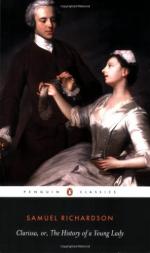Thy servant is not to return without a letter, he tells me; and that thou expectest him back in the morning. Thou hast fellows enough where thou art at thy command. If I find any difficulty in seeing the lady, thy messenger shall post away with this.—Let him look to broken bones, and other consequences, if what he carries answer not thy expectation. But, if I am admitted, thou shalt have this and the result of my audience both together. In the former case, thou mayest send another servant to wait the next advices from
J. Belford.
LETTER XVI
Mr. Belford, to Robert Lovelace,
ESQ.
Monday, July 17.
About six this morning, I went to Rowland’s. Mrs. Sinclair was to follow me, in order to dismiss the action; but not to come in sight.
Rowland, upon inquiry, told me, that the lady was extremely ill; and that she had desired, that no one but his wife or maid should come near her.
I said, I must see her. I had told him my business over-night, and I must see her.
His wife went up: but returned presently, saying, she could not get her to speak to her; yet that her eyelids moved; though she either would not, or could not, open them, to look up at her.
Oons, woman, said I, the lady may be in a fit: the lady may be dying—let me go up. Show me the way.
A horrid hole of a house, in an alley they call a court; stairs wretchedly narrow, even to the first-floor rooms: and into a den they led me, with broken walls, which had been papered, as I saw by a multitude of tacks, and some torn bits held on by the rusty heads.
The floor indeed was clean, but the ceiling was smoked with variety of figures, and initials of names, that had been the woeful employment of wretches who had no other way to amuse themselves.
A bed at one corner, with coarse curtains tacked up at the feet to the ceiling; because the curtain-rings were broken off; but a coverlid upon it with a cleanish look, though plaguily in tatters, and the corners tied up in tassels, that the rents in it might go no farther.
The windows dark and double-barred, the tops boarded up to save mending; and only a little four-paned eyelet-hole of a casement to let in air; more, however, coming in at broken panes than could come in at that.
Four old Turkey-worked chairs, bursten-bottomed, the stuffing staring out.
An old, tottering, worm-eaten table, that had more nails bestowed in mending it to make it stand, than the table cost fifty years ago, when new.
On the mantle-piece was an iron shove-up candlestick, with a lighted candle in it, twinkle, twinkle, twinkle, four of them, I suppose, for a penny.
Near that, on the same shelf, was an old looking-glass, cracked through the middle, breaking out into a thousand points; the crack given it, perhaps, in a rage, by some poor creature, to whom it gave the representation of his heart’s woes in his face.




